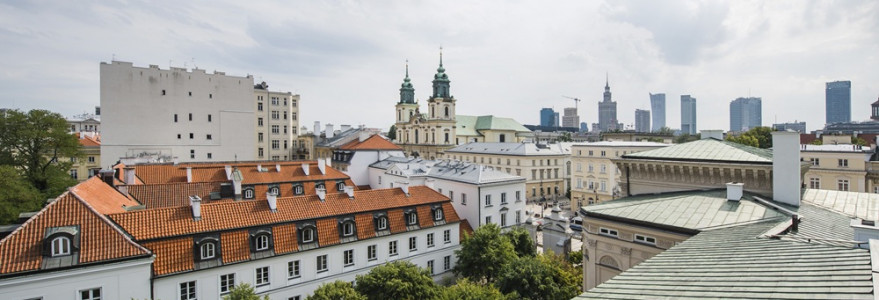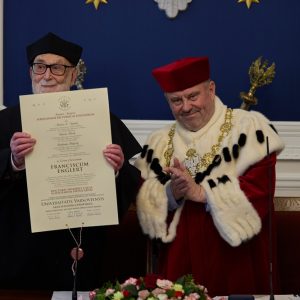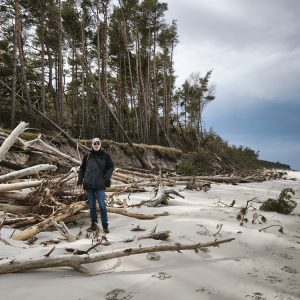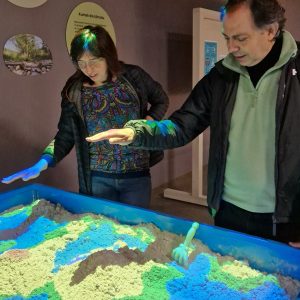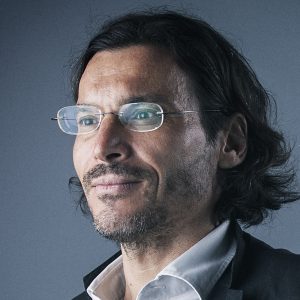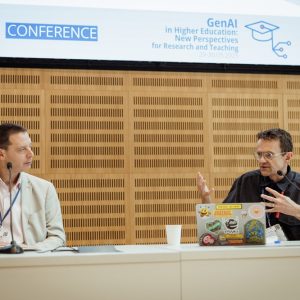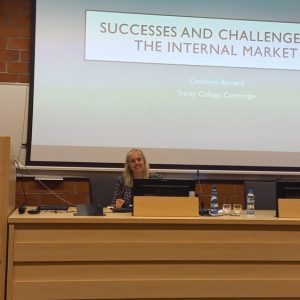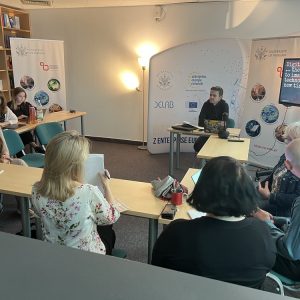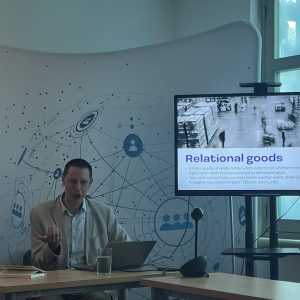Nobel Prize winners, world-renowned experts, lecturers from prestigious foreign universities. So far, more than 70 outstanding scientists have visited the University of Warsaw as part of the “Mentoring Programme” implemented with IDUB funds.
“One of the priorities of the IDUB Programme is the internationalisation of scientific research conducted at the UW. ‘The Mentoring Programme’ fosters this by enabling face-to-face meetings, establishing new and strengthening existing relationships with internationally renowned institutions,” says Prof. Zygmunt Lalak, the UW Vice-Rector for Research, head of the “Excellence Initiative – Research University” (IDUB) Programme.
Implemented with IDUB funds, the “Mentoring Programme” supports organisation of mentoring visits and arrivals of outstanding experts from foreign universities and research institutions at the University of Warsaw. So far, four editions of the programme have been implemented and more than 70 grants have been awarded.
Guests at the UW included:
- Prof. Catherine Barnard from the University of Cambridge and Trinity College (at the invitation of Prof. Robert Grzeszczak’s team from the UW’s Faculty of Law and Administration) – she is an expert in the EU and labour law, a member of the European Labour Law Network funded by the European Commission;
- Dr Sebastian Dworkin from La Trobe University in Melbourne (at the invitation of Prof. Tomasz Wilanowski’s team from the UW’s Faculty of Biology) – he heads a research group dealing with developmental genetics, his research interests include embryology;
- Prof. Cristian Echeverria from Universidad de Concepción in Chile (at the invitation of Prof. Sylwia Kulczyk’s team from the Faculty of Geography and Regional Studies) – he is a landscape ecologist, vice-president of the World Association for Landscape Ecology (IALE), leader of the Campus Naturaleza project – a cutting-edge initiative which consists of restoring the forest adjacent to the university to a natural state in a way that combines the protection of biodiversity with human well-being;
- Prof. François Englert (at the invitation of Prof. Stefan Pokorski and Prof. Dariusz Wąsik from the UW’s Faculty of Physics and researchers from the UW’s Institute for Advanced Studies) – Nobel Prize winner in Physics in 2013, which he received together with Prof. Peter Higgs for the ground-breaking discovery of the Brout-Englert-Higgs mechanism – the basis of the modern theory of elementary interactions, i.e. the Standard Model; he received honorary doctorate at the University of Warsaw, his collaboration with UW scientists contributed to the development of innovative research at the Faculty of Physics;
- Prof. Patrick Alan Hesp of Flinders University in Adelaide, Australia (at the invitation of Prof. Maciej Dłużewski’s team from the UW’s Faculty of Geography and Regional Studies) – he is a world-renowned aeolian geomorphologist, who for many years has been conducting research on the conditions and effects of aeolian processes in the coastal zone of the seas and oceans; he was awarded the ISAR Distinguished Career Award by the International Society for Aeolian Research in 2023, in recognition of his long and fruitful work in the field of aeolian geomorphology;
- Prof. Peter Kahn, University of Manchester, United Kingdom (invited by Prof. Renata Włoch’s team from the Digital Economy Lab, Centre of Excellence and the UW’s Faculty of Sociology) – he is an expert in critical higher education research on topics including digital technologies, generative artificial intelligence, collaboration and sustainability; he was awarded a National Teaching Fellowship in 2014 and is a core member of the Higher Education Academy and editor of the international journal “Teaching in Higher Education”;
- Prof. Michael D. Kennedy from Brown University in Providence (at the invitation of Dr Andrzej Turkowski’s team from UW’s Robert Zajonc Institute for Social Studies) – he is a professor of sociology and international relations, a well-known researcher of post-communist transformation, as well as global transformations of the system of academic knowledge creation;
- Prof. Neil Selwyn from Monash University Wellington Rd in Australia (at the invitation of Prof. Katarzyna Śledziewska’s team from the UW’s Digital Economy Lab and the Centre of Excellence) – he is an international authority in the field of digital education and a regular speaker at international conferences; he has collaborated with many international organisations, including the UN, UNESCO, OECD, the Council of Europe, Fundación BBVA;
- Prof. Marco Zorzi from the University of Padua (at the invitation of Prof. Maciej Haman’s team from the UW’s Faculty of Psychology and the Rector’s Team for the UW’s Neuroimaging Centre) – he is an eminent neurocognitive scientist, whose works are at the borderline of cognitive psychology, neuropsychology, computer science (machine learning and artificial intelligence) and neuroscience, focusing on the computational basis of human cognition.
Lectures, seminars and consultations
Researchers visiting the University of Warsaw meet the university community, for example, during their lectures. Students, doctoral candidates and employees of the University of Warsaw have so far had the opportunity to listen to Prof. Catherine Barnard’s lecture on the internal market of the European Union, Prof. Neil Selwyn’s lecture on new technologies or Prof. Peter Kahn’s lecture on the role of the university in shaping students’ ability to respond collectively to global challenges. Two open lectures each were given by Prof. Marco Zorzi (“Computational modelling of cognition: methods and challenges” and “From pixels to numbers: Numerosity perception in humans and machines”) and Prof. Patrick Alan Hesp (“Geomorphological [Coastal] Extreme Processes”, “New challenges in Aeolian Geomorphology research”). Speeches by Prof. Michael D. Kennedy (“Globalizing Knowledge in Epoch End: Contrasting Conjunctures of Hope and of Catastrophe in the Making”, “Articulations of Intellectual and Moral Responsibility across University Communities with regard to Israel and Palestine”) and Dr Sebastian Dworkin (“Principles of embryology, stem cells and craniofacial development”) also attracted a large audience. A lecture by Prof. Cristian Echeveriii (“From University Grounds to Biodiversity Hotspot: a Model for Conservation, Restoration and Human Well-being in Chile”) generated a lively discussion. It was also attended by the Ambassador of the Republic of Chile to Poland, Rodrigo Ruiz.
Visitors also provided consultations (e.g. with Prof. Barnard on ongoing research projects with topics related to the EU internal market), conducted seminars (e.g. with Dr Dworkin on the discovery of new genetic pathways in embryonic development) and participated in scientific conferences organised at the UW (Prof. Selwyn and Prof. Kahn took part, for example, in a debate within the framework of GenAI in Higher Education: New Perspectives for Research and Teaching organised by the UW’s Digital Economy Lab with funds from the IDUB Programme).
An important highlight of the mentoring visits are the talks with UW students, doctoral candidates and employees. Prof. Marco Zorzi, for example, took part in three formal meetings with a student societies at the UW’s Faculty of Psychology. The topic of the talks was the relationship between generative artificial intelligence and the modelling of human cognitive processes, such as number perception. Meanwhile, a meeting with members of the Rector’s Team for the UW’s Neuroimaging Centre concerned the exchange of experiences in, for isntance, equipping the Centre with infrastructure for neuroimaging research.
During the talks by scientists from the UW’s Faculty of Geography and Regional Studies, Prof. Patrick Alan Hesp shared valuable knowledge on the impact of climate change on the dynamics of extreme geomorphological processes. Together with the expert, the University employees sought to develop better, more accurate methods of acquiring and interpreting data for modelling selected elements of the natural environment, mainly in the coastal zone of seas and oceans, as well as in other morphoclimatic zones where extreme geomorphological processes occur.
Prof. Hesp, as the main author of the dune typology introduced by the International Society for Aeolian Research into the canon of world science in 2024, also visited the Slovincian National Park, where he led a debate on the evolution and typology of the dunes occurring on the Łeba Spit among the employees of the University of Warsaw, as well as other specialists in aeolian geomorphology.
It is impossible to discuss the importance of nature for humans without a field visit. Prof. Echeverria enthused about the Masurian Center for Biodiversity and Education KUMAK. It turned out that the activities carried out at the UW and the Universidad de Concepción share a similar vision of nature conservation, but the challenges of implementing it differ. The exchange of experiences resulted in ideas for joint research, didactic inspiration and operational knowledge.



